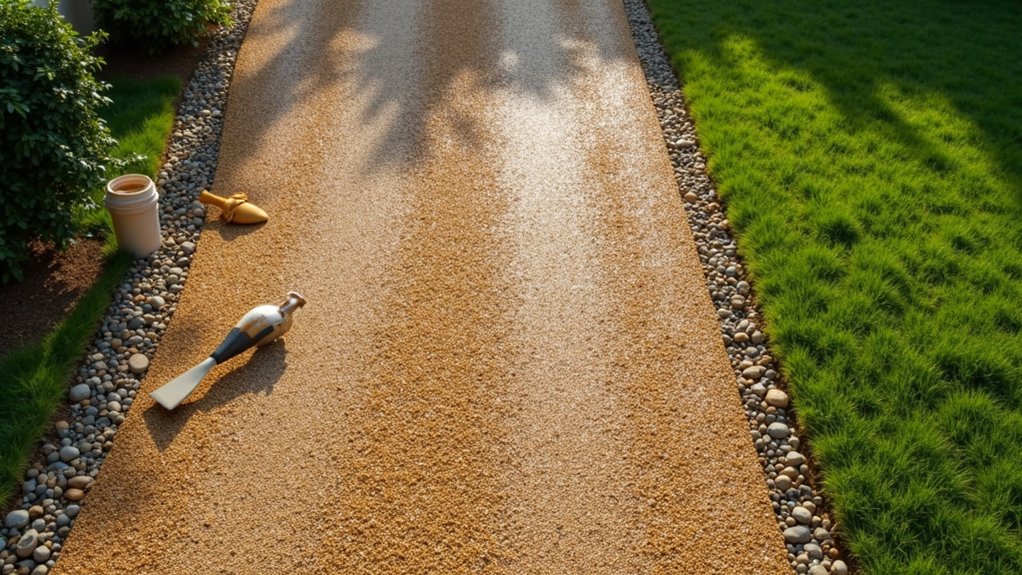The most economical approach to a resin-bound gravel driveway starts with simple, rectangular designs and locally sourced aggregates. If you’ve got an existing concrete or tarmac base in good nick, you’ll save considerably on groundwork costs. Get quotes from at least three contractors and compare their material options – some aggregates cost far less than others whilst looking just as smart. Proper preparation is crucial; skimping on the base layer will cost more in repairs down the line. A well-installed resin driveway needs only basic maintenance like regular brushing and occasional pressure washing to stay tip-top for years.
Key Takeaways
Money-Saving Tips for Resin-Bound Driveways:
- Pick basic resin and aggregate options instead of premium materials – saves £15-20 per m² without compromising quality.
- Make use of your existing concrete or tarmac base if it’s in good nick – cuts out hefty groundwork costs.
- Ring round at least three local installers for quotes – prices can vary widely across different firms.
- Keep the shape straightforward – fancy curves and angles cost more in both labour and materials.
- Book your installation for autumn – many contractors offer better rates outside the busy summer months.
*All costs mentioned are rough estimates for UK markets and may vary by region.
Understanding Resin-Bound Gravel Driveways
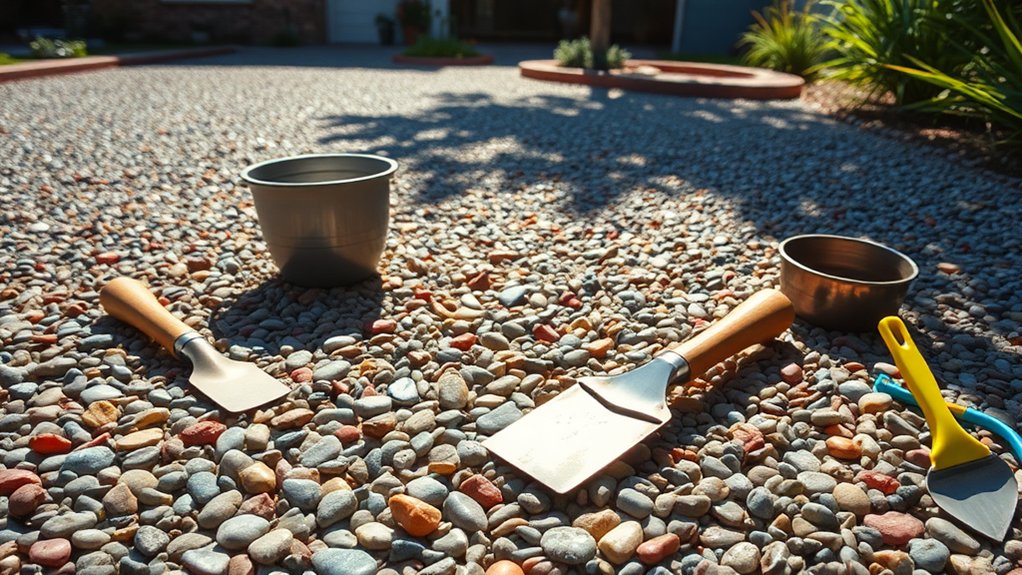
Resin-bound gravel driveways offer a practical and attractive solution for UK homes. The system mixes stone or marble aggregates with premium resin to create a solid, long-lasting surface. Installation requires a sound base, followed by the careful blending and laying of materials at 12-24mm depth using professional trowelling techniques.
A key benefit for British weather is the surface’s excellent drainage, helping prevent puddles and flooding during heavy rainfall. The UV-resistant resin maintains its appearance despite our varied climate, whilst the smooth finish means no loose stones to scatter across the garden or damage car tyres. Additionally, this surface is designed to manage heavy rainfall, making it especially beneficial for areas prone to flooding effective drainage solutions. This permeability not only decreases flood risks but also supports environmental commitments in campus planning.
Think of it as a giant jigsaw where small stones lock together permanently – much neater than traditional gravel and far more durable than basic concrete. For UK homeowners seeking a low-maintenance driveway that looks smart year-round, resin-bound gravel ticks all the boxes.
Cost Breakdown of Resin-Bound Installation
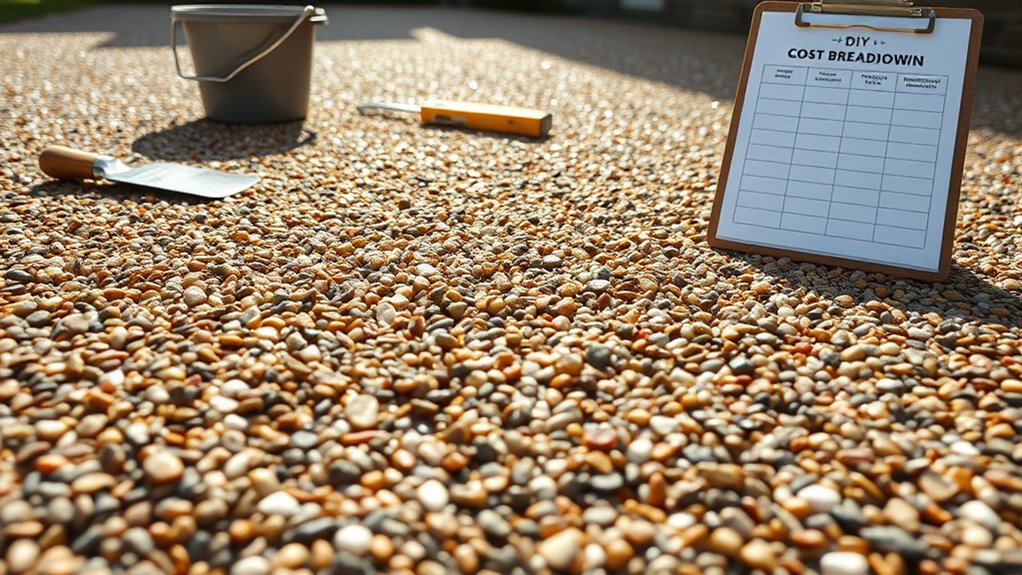
The cost of a resin-bound driveway depends on several key factors that UK homeowners should consider. Material quality ranges from standard to premium aggregates, whilst installation costs vary based on your driveway’s size and complexity. Labour charges typically account for 40-50% of the total cost. A straightforward 50m² driveway installation might cost between £3,500 and £5,000, though prices in London and the South East tend to be higher. Selecting local aggregates over imported stones can reduce material costs, and choosing a simpler pattern saves on labour time. Essential factors affecting your final price include: – Ground preparation requirements – Type and quality of resin and aggregate – Site access and layout complexity – Regional labour rates – Additional features (drainage, edging) Overall driveway durability is often enhanced by using quality materials that adhere to industry standards. Average Resin Driveway Cost Most UK installers offer free quotes, making it worthwhile to compare several estimates before committing. Remember to check that your chosen contractor is fully insured and can provide local references.
Pricing Factors Overview
The cost of installing a resin-bound gravel driveway depends on several key factors. Materials typically cost between £5 to £8 per square foot, with a standard 22-square-metre driveway requiring £1,100 to £1,760 worth of resin and aggregate. Labour charges range from £600 to £1,000, varying by region and job complexity. A straightforward rectangular driveway costs less than one with curves or intricate patterns. Proper groundwork is crucial – skimping on base preparation often leads to costly repairs later. Effective drainage is essential to protect your investment and help filter pollutants from water. Remember to include delivery costs and any required council permits in your budget. Quality of materials makes a significant difference; premium resins and aggregates cost more but offer better durability and finish. Additionally, custom designs can significantly increase the overall project costs, especially if unique patterns or shapes are desired.
Cost-Saving Strategies
Cost-Cutting Tips for Resin Driveways
Smart choices can significantly reduce your resin driveway costs without compromising quality:
- Opt for standard resin and stones rather than premium blends – you’ll typically save £15-20 per square metre.
- Choose straightforward shapes like rectangles – fancy curves and angles add labour time and push up costs.
- If your existing concrete or tarmac base is solid, use it. A new sub-base costs roughly £30 per square metre extra.
- Get quotes from at least three local contractors – prices can vary by 20% or more for the same job.
These practical steps often slash hundreds of pounds off the total project cost whilst maintaining a quality finish.
Factors Affecting the Overall Cost
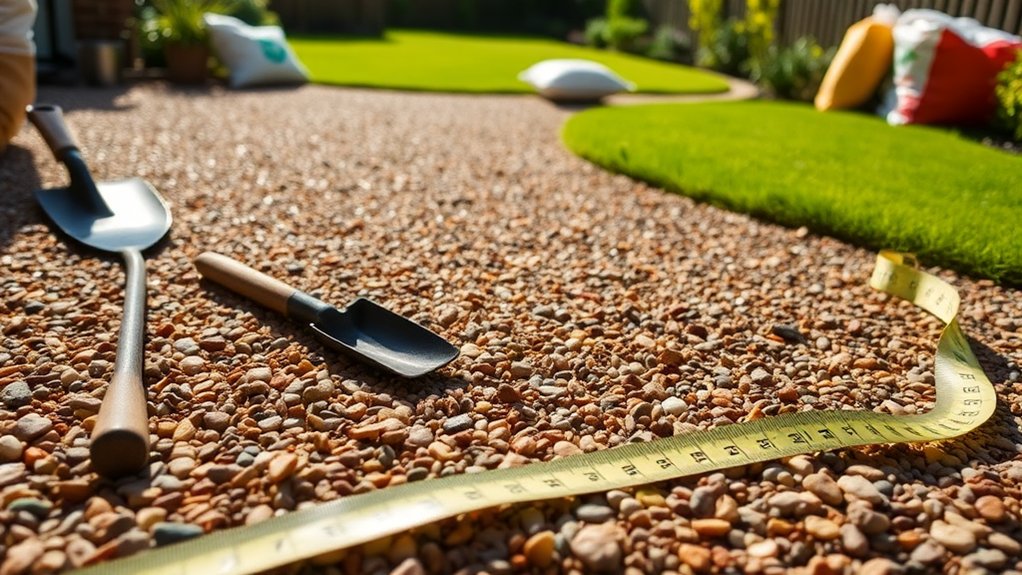
Several key factors affect the cost of installing a resin-bound gravel driveway. The size of your driveway is the main cost driver – whilst larger areas need more materials, they often qualify for bulk discounts. The shape matters too; a simple rectangular driveway costs less to install than one with curves or complex patterns.
Your choice of resin quality plays a crucial role in the final price. Premium resins might cost more initially but typically offer better durability and UV resistance – particularly important for driveways exposed to British weather. Standard resins work well for less demanding areas like garden paths.
The state of your existing surface can significantly impact costs. A sound, level concrete base needs minimal preparation, whilst a cracked or uneven surface requires repairs before installation. This extra groundwork can add hundreds of pounds to your project.
| Factor | Impact on Cost | Notes |
|---|---|---|
| Driveway Dimensions | More area = higher costs | Larger may qualify for discounts |
| Type & Quality of Resin | Premium resins = higher costs | Affects durability and colour longevity |
| Existing Surface Condition | Repairs increase preparation costs | Clean, level bases are more affordable |
Comparing Resin-Bound Driveways to Other Options
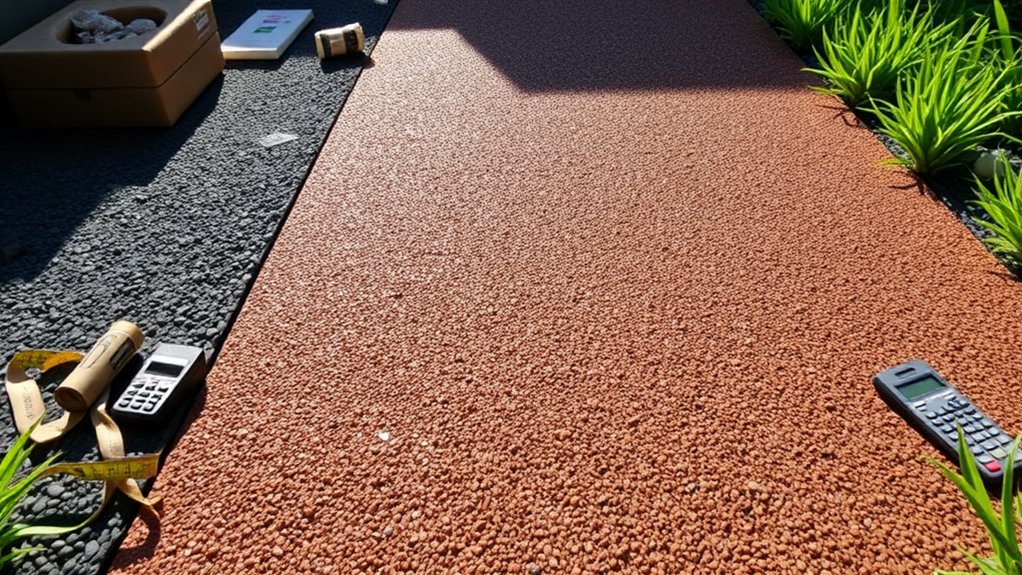
Comparing Resin-Bound Driveways to Alternatives
A resin-bound gravel driveway offers distinct advantages over traditional surfacing options in the UK market:
- Durability: Resin-bound surfaces withstand British weather brilliantly, showing better crack resistance than standard concrete or tarmac.
- Aesthetic Flexibility: Choose from countless colour and stone combinations to match your property – far more options than traditional concrete or block paving.
- Cost Efficiency: Despite higher initial costs (roughly £50-£75 per m²), resin-bound driveways need minimal upkeep, making them cost-effective long-term.
- Installation Speed: A typical resin driveway takes 2-3 days to install, whilst block paving often requires a week or more, with higher labour costs.
Tips for Reducing Installation Expenses

Smart ways to save on resin driveways:
Stick to basic designs and standard stones from UK suppliers – fancy patterns and rare aggregates drive up costs significantly.
Square or rectangular layouts work out cheaper than curved or complex shapes.
Choose local contractors with proven experience in resin installations.
They’ll understand regional materials and conditions, plus you’ll avoid paying for long-distance travel fees.
Ask to see their previous work in your area.
Opt for readily available aggregates like granite or quartz from British quarries rather than imported stones.
These materials perform well in UK weather and cost less than specialist options.
Time your installation for spring or autumn when weather conditions are ideal and contractors may offer better rates than during peak summer months.
Choose Simple Designs
Simple Designs for Resin Driveways
Choosing straightforward designs for your resin-bound gravel driveway improves its look whilst reducing installation costs.
Simple designs speed up the job and save money.
Key design tips:
- Keep Corners to a Minimum: Each corner adds waste and labour time. A basic rectangular layout works best.
- Stick to Basic Shapes: Square and rectangular patterns are quicker to install than curved or complex designs.
- Pick One or Two Colours: Multiple aggregate colours drive up costs. Traditional grey or tan options suit most homes.
- Avoid Extra Features: Each drainage cover or decorative insert increases both material and labour costs.
These practical choices create an attractive driveway that’s cost-effective and durable.
Most British homes benefit from classic, unfussy designs that complement existing architecture.
Select Standard Materials
Standard materials keep resin-bound driveway costs manageable whilst ensuring quality results.
Choose common aggregates like pea gravel from local UK suppliers to reduce transport fees. Popular gravels from nearby quarries work perfectly well – there’s no need for expensive imported stone.
Standard UV-stable resins from established British manufacturers offer excellent value, especially when bought in bulk. Always check that your resin and aggregate choices are compatible to avoid costly mistakes.
Proper measurements and standard pack sizes help prevent wastage and keep your project on budget. Think B&Q rather than boutique suppliers – you’ll get reliable materials without the premium price tag.
Hire Local Contractors
Choosing Local Contractors
Once you’ve gathered your resin-bound gravel materials, hiring local contractors makes sound financial sense. Local experts deliver key advantages whilst keeping costs manageable:
- Economic Benefits: Lower transport costs and direct support for your local economy.
- Quick Response: Local firms can pop round swiftly when needed, keeping your project on track.
- Area Knowledge: Understanding of local weather patterns, council regulations and ground conditions proves invaluable.
- Better Value: Smaller overheads mean local contractors typically charge less than major companies – expect to save 10-15% on average.
Importance of Proper Site Preparation
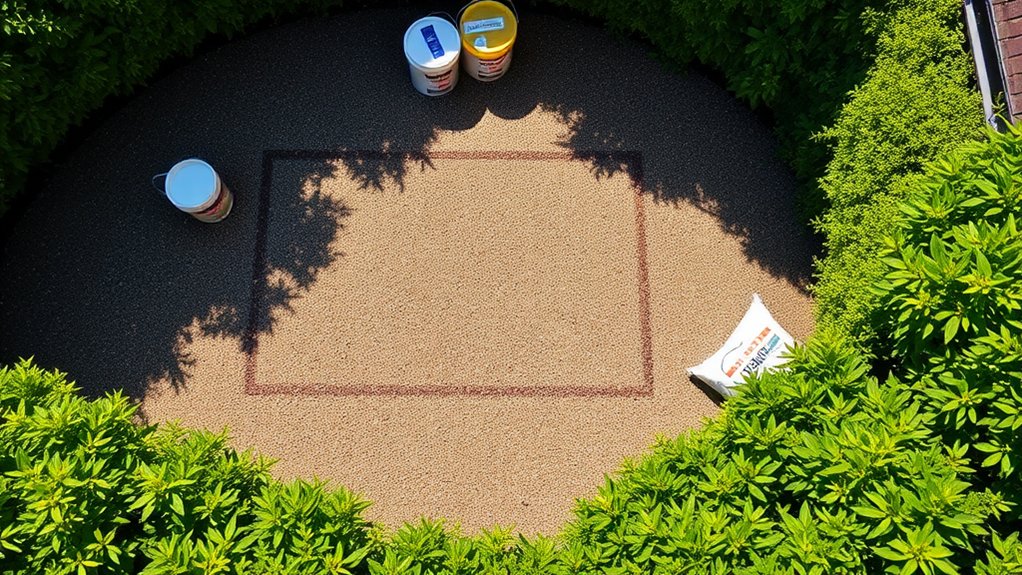
Proper groundwork is crucial for a lasting resin-bound gravel driveway. First, check your site’s stability – the surface must be firm enough to prevent any cracking. Remove all grass, weeds and rubbish to ensure the resin bonds properly.
Build a solid foundation at least 100mm deep using MOT Type 1 aggregate – the same material used for motorway bases. Keep it perfectly level, as any dips or bumps will show through the finished surface.
Getting the drainage right is essential for British weather. Your driveway needs proper slopes and channels to handle heavy rain, much like a garden patio. Without good drainage, you’ll end up with puddles and damaged surfaces.
Make sure everything’s bone dry before laying the resin – moisture is your worst enemy. Think of it like painting a wall; you wouldn’t start if it were damp.
These basic steps might seem fussy, but they’re the difference between a driveway that lasts 15 years and one that fails after the first winter.
Maintenance Considerations for Longevity
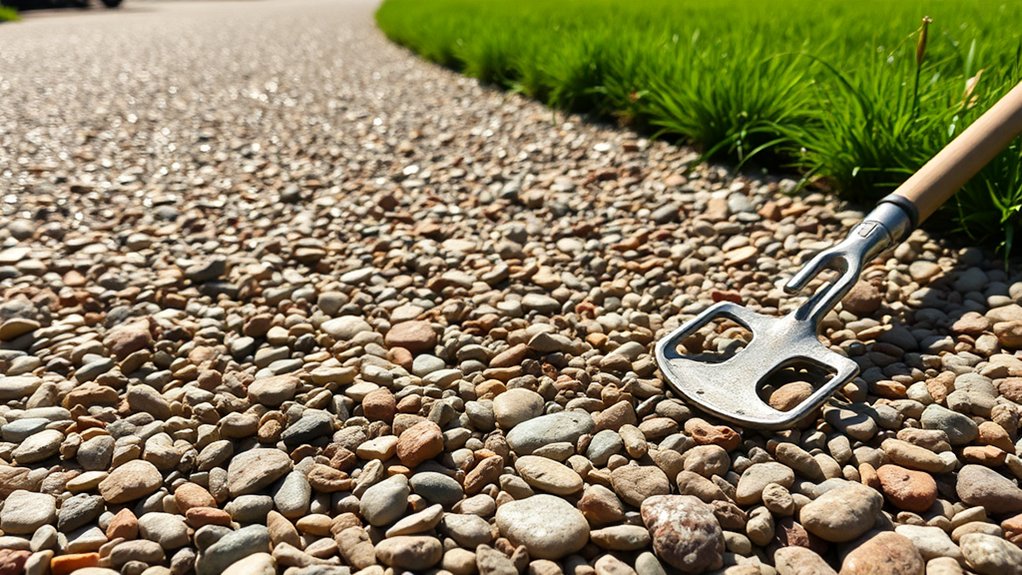
Maintaining a Resin-Bound Gravel Driveway
A resin-bound driveway needs regular upkeep to stay in prime condition. Follow these key maintenance steps:
- Regular Cleaning: Brush away leaves and debris monthly, and give it a proper wash with soapy water twice yearly – much like you’d clean your patio.
- Weed Control: Check for weeds every few months, especially in spring. Pull them out straight away to prevent root damage to the surface.
- Resealing: Book a professional reseal every 3-5 years, or sooner if you notice the surface becoming dull (similar to varnish wearing off furniture).
- Drainage Check: Keep drainage channels clear of debris, particularly after autumn leaf fall. Sort any pooling issues quickly to avoid frost damage in winter.
These simple habits will protect your investment and keep your driveway looking smart for years to come.
Common Mistakes to Avoid During Installation
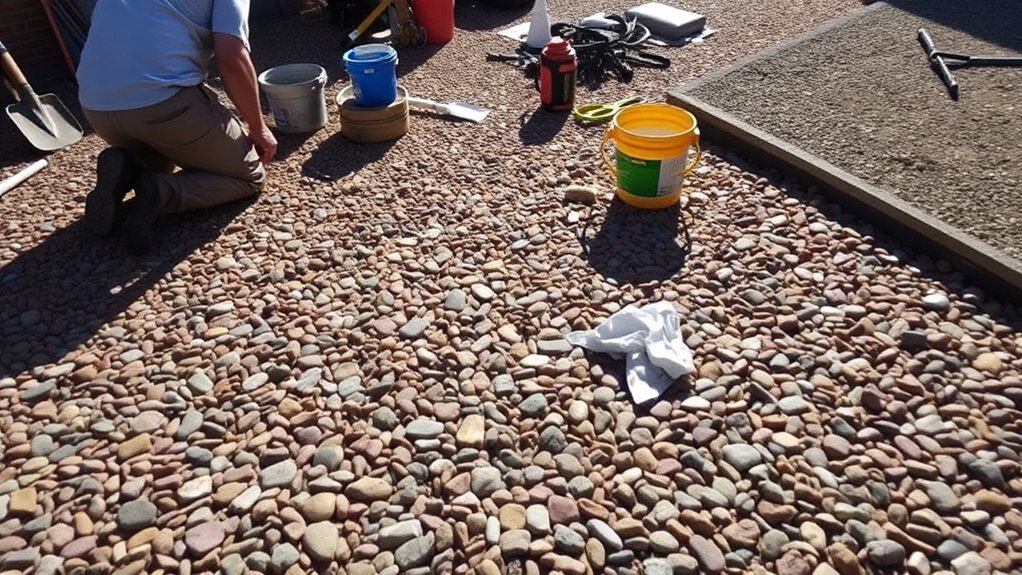
Common Installation Mistakes to Avoid
A proper resin-bound gravel driveway starts with getting the basics right. First, select base materials that match your driveway’s expected use – whether it’s for family cars or heavy vehicles. Much like building a house, a weak foundation leads to problems.
Think of the base as your driveway’s backbone; cut corners here, and you’ll face cracks and dips later.
Poor drainage is another common pitfall. Your base must be porous – similar to a good garden soil that doesn’t waterlog. When mixing resin, stick to manufacturer ratios (much like following a recipe) and maintain the recommended depth throughout.
Weather matters enormously. Installing in rain or extreme temperatures is like painting outdoors in poor conditions – it simply won’t work properly.
Once laid, protect your new surface from immediate use. A fortnight’s proper curing time saves months of headaches later.
Mind these basics during installation, and you’ll have a driveway that stands up to British weather whilst looking smart for years to come.
Evaluating Long-Term Savings and Benefits
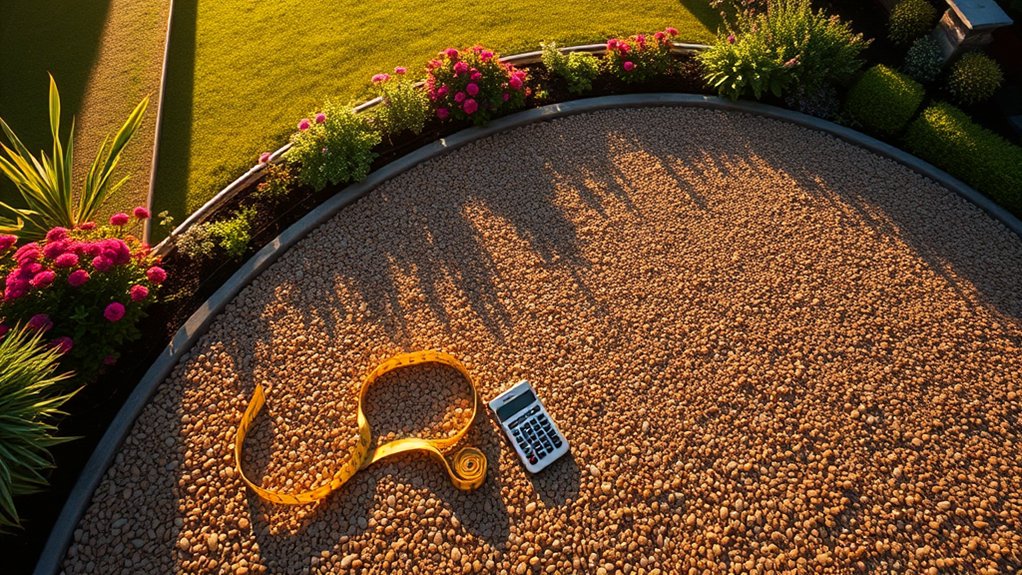
Investing in a Resin-Bound Driveway: Long-Term Value
A resin-bound gravel driveway boosts your property’s kerb appeal whilst delivering substantial cost benefits over time:
1. Durability: Lasts 15-25 years with basic upkeep – far longer than traditional tarmac or concrete surfaces.
No need for yearly repairs or patching.
2. Low-Cost Maintenance: Simple spot repairs for damaged areas, rather than replacing entire sections as with conventional driveways.
Much like fixing a small crack in a window versus replacing the whole pane.
3. Environmental Benefits: Natural water drainage reduces flood risk and complies with UK planning regulations, avoiding potential council penalties.
4. Added Value: Customisable colours and patterns boost property value.
Estate agents often highlight quality driveways as key selling points.
Frequently Asked Questions
Can I Use Recycled Materials for Resin-Bound Driveways?
Recycled aggregates work perfectly well in resin-bound driveways. Common options include recycled glass, crushed porcelain and reclaimed stone – all offering the same durability as traditional materials whilst being kinder to the environment. These sustainable choices maintain the clean, polished look of a resin driveway and often cost less than new aggregates.
How Long Does the Installation Process Typically Take?
Installation of a resin-bound driveway typically takes 1-2 days for standard-sized projects. Larger driveways or those with tricky access might stretch to a week, whilst poor weather conditions can cause delays. Your contractor should provide a precise timeline during the initial consultation.
Are There Color Options Available for Resin-Bound Gravel?
A wide range of colours is available for resin-bound gravel, from classic browns and greys to modern silvers and golds. By blending different stones, you can create a bespoke finish that complements your home’s exterior. Popular choices amongst UK homeowners include natural buff tones for period properties and contemporary slate-grey mixes for modern builds.
What Weather Conditions Can Affect Installation?
Weather significantly affects resin-bound driveway installation. The surface must be completely dry, and temperatures need to stay above 5°C throughout the process. Installing in wet conditions or cold temperatures can lead to poor bonding and a weakened surface that won’t last.
Can I Install Resin-Bound Gravel Over Existing Surfaces?
Yes, resin-bound gravel can be laid over existing surfaces, provided they’re stable and in good nick. For best results, ensure proper drainage and check that your base surface (be it concrete or tarmac) is compatible and crack-free. A sound foundation is vital – much like building a house, you wouldn’t want to start with dodgy groundwork.
Conclusion
To conclude, installing a resin-bound gravel driveway offers a cost-effective and smart upgrade for your property. With careful planning, proper site preparation and awareness of potential mistakes, you’ll create a lasting surface at a reasonable price. Think of it as a practical home improvement project—similar to upgrading your heating controls. Done properly, you’ll benefit from both immediate cost savings and a durable driveway that adds real value to your home.
